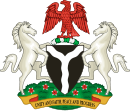
Back النيجيريين ARZ Νιγηριανοί Greek Pueblo nigeriano Spanish Nigérians French Ɗan Nijeriya Hausa Orang Nigeria ID Ndị Naijiria IG Nigerian IGL Nigeryjczycy Polish Nigerianët Albanian
 | |
| Regions with significant populations | |
|---|---|
| 233,668,528[1] | |
| 6,000,000[2] | |
| 4,000,000[3] | |
| 461,895[4] | |
| 312,000 (2021)[5] | |
| 155,000[6] | |
| 111,465[7] | |
| 106,069[8] | |
| 100,000[9] | |
| 4,000[6] | |
| 88,000 | |
| 79,547 (2022 census)[10] | |
| 77,000[11] | |
| 60,000[citation needed] | |
| 60,000[6] | |
| 60,000[12] | |
| 50,000[6] | |
| 44,791[13] | |
| 36,500+[14] | |
| 32,000[6] | |
| 24,000[6] | |
| 20,000[6] | |
| 19,286[15] | |
| 20,559[16] | |
| 16,000[6] | |
| 6,000[6] | |
| 5,000[6] | |
| 5,000[6] | |
| 5,000[6] | |
| 4,519[17] | |
| 4,000[6] | |
| 4,000[6] | |
| 4,000[6] | |
| 3,000[18] | |
| 3,000[6] | |
| 3,000[19] | |
| 3,000[6] | |
| 2,000[6] | |
| 2,000[6] | |
| 2,000[6] | |
| 1,780[20] | |
| 1,636[15] | |
| 1,425[15] | |
| 1,000[6] | |
| Languages | |
| Nigerian English, regional languages | |
| Religion | |
| Islam, Christianity, Traditional African religions | |
| This article is part of a series in |
| Culture of Nigeria |
|---|
 |
Nigerians or the Nigerian people are citizens of Nigeria or people with ancestry from Nigeria.[21] The name Nigeria was derived from the Niger River running through the country. This name was allegedly coined in the late 19th century by British journalist Flora Shaw, who later married Baron Frederick Lugard, a British colonial administrator.[22] Nigeria is composed of various ethnic groups and cultures and the term Nigerian refers to a citizenship-based civic nationality.[21] Nigerians are derived from over 250 ethno-linguistic groups.[23] Though there are multiple ethnic groups in Nigeria, economic factors result in significant mobility of Nigerians of multiple ethnic and religious backgrounds to reside in territories in Nigeria that are outside their ethnic or religious background, resulting in the mixing of the various ethnic and religious groups, especially in Nigeria's cities.[24] The English language is the lingua franca of Nigerians.[25] Nigeria is divided roughly in half between Muslims, who live mostly in the north, and Christians, who live mostly in the south; indigenous religions, such as those native to the Igbo and Yoruba ethnicities, are in the minority.[26]
- ^ https://worldpopulationreview.com/countries/nigeria
- ^ "EXCLUSIVE: As Benin Republic clocks 53: Over 6m Nigerians live in former Dahomey, 200 in jails but Amb Obisakin says 'Nigeria is a power here, there's no doubt about it'". sunnewsonline.com. Archived from the original on 2013-10-12.
- ^ Mark D. DeLancey, Rebecca Neh Mbuh. Historical Dictionary of the Republic of Cameroon. Scarecrow Press, 2010. p. 283.
- ^ ACS, 2019
- ^ "Population of the United Kingdom by country of birth and nationality, July 2020 to June 2021". ons.gov.uk. Office for National Statistics. Archived from the original on 3 January 2024. Retrieved 5 February 2023..
- ^ a b c d e f g h i j k l m n o p q r s t u "Immigrant and Emigrant Populations by Country of Origin and Destination". migrationpolicy.org. February 10, 2014.
- ^ "Immigrant status and period of immigration by place of birth and citizenship: Canada, provinces and territories and census metropolitan areas with parts". Statistics Canada. Statistics Canada Statistique Canada. 7 May 2021. Retrieved 3 January 2023.
- ^ "BILANCIO DEMOGRAFICO NAZIONALE" (PDF). Directorate for social statistics and population census Istat – National Institute of Statistics. p. 10.
- ^ mevans, Bild: istockphoto com /. "Demographie". Statista.
- ^ "Saudi Arabia 2022 Census" (PDF). General Authority for Statistics (GASTAT), Kingdom of Saudi Arabia. Archived from the original (PDF) on 2024-04-28. Retrieved 2024-10-14.
- ^ Maguire, Ken (30 May 2010). "Nigerians fight bad reps in Ghana". Retrieved 6 January 2016.
- ^ "Immigrant and Emigrant Populations by Country of Origin and Destination". migrationpolicy.org. February 10, 2014.
- ^ Nigeria - International emigrant stock
- ^ "Nigerians in South Africa" (PDF). www.migration.org.za. 2017. Retrieved 2020-04-28.
- ^ a b c "Bevölkerung nach Staatsangehörigkeit und Geburtsland". Statistik Austria. Retrieved 18 March 2015.
- ^ McFadyen 2008, p. 55
- ^ "Australian Government Department of Immigration and Border Protection" (PDF). immi.gov.au. Archived from the original (PDF) on 2013-10-12. Retrieved 2013-10-05.
- ^ "Buhari ask Nigerians in Portugal to join in promoting Nigeria's unity …reiterates commitment to Peaceful election in 2023".
- ^ "AthensNews onLine SEARCH". Archived from the original on 2009-02-12. Retrieved 2013-10-05.
- ^ "Innvandrere og norskfødte med innvandrerforeldre - Tabeller - SSB". Retrieved 18 March 2015.
- ^ a b Gordon, April A. (2003). Nigeria's diverse peoples: a reference sourcebook. Ethnic diversity within nations. Santa Barbara, California, USA: ABC-CLIO, Inc. p. 233. ISBN 1576076822.
- ^ "History – Ministry of Foreign Affairs, Nigeria". Retrieved 2023-06-01.
- ^ Toyin Falola. Culture and Customs of Nigeria. Westport, Connecticut, USA: Greenwood Press, 2001. p. 4.
- ^ Toyin Falola. Culture and Customs of Nigeria. Westport, Connecticut, USA: Greenwood Press, 2001. p. 8.
- ^ April A. Gordon. Nigeria's Diverse Peoples: A Reference Sourcebook. Santa Barbara, California, USA: ABC-CLIO, 2003. p. 233.
- ^ "Nigeria Fact Sheet" (PDF). United States Embassy in Nigeria. Archived from the original (PDF) on 18 October 2020. Retrieved 23 September 2018.